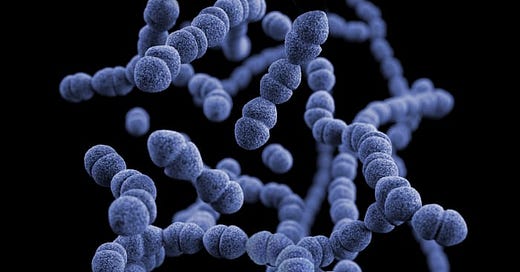The Bacteria In Our Gut Could Help With Protection Against A COVID-19 Infection.
And so the headline ran — proclaiming information that couldn’t be more obvious.
It’s quite interesting that we’ve been in this COVID-19 pandemic stage for so long, but only now then do researchers come up with research papers that tell us how gut health can help us to deal with a COVID-19 infection. In one of the latest research papers Metabolites with SARS-CoV-2 Inhibitory Activity Identified from Human Microbiome Commensals by Piscotta et. al., I thought of a funny question.
Isn’t this just commonsensical knowledge?
Perhaps it might be more commonsensical to me than to the less scientifically inclined people.
We know that the microorganisms in our gut can cause our body to respond in various different manners biochemically:
And one of them is that they can influence how the immune system responds.
Which is the crux of Piscotta et. al.’s paper. They were able to find various metabolites that had antiviral properties against the SARS-CoV-2 virus.
Now, many of us wouldn’t necessarily know what a “metabolite” may be.
A metabolite is but a biochemical that is produced by a microbe. Basically, we feed the microbe some nutrient or biochemical, and it takes what it is being fed and biochemically converts that feed into something else. That something else is the metabolite.
It’s highly similar to how we can shovel food down our throats, and then at the end of the day produce some (perhaps foul-smelling) “metabolites” in the toilet bowl from that food.
And the intensity of the smell (and appearance) of those metabolites in the toilet bowl is heavily dependent on what we feed ourselves with.
A predominantly vegetarian diet would result in a different type of “metabolite” from the Standard American Diet, of course.
Some metabolites are able to behave somewhat like cytokines, which will also then exert their own influence on the immune response in the body.
Therefore, in that metabolite study, Piscotta et. al. were able to isolate 3 significant metabolites that had anti-COVID activities. These metabolites included (but are not necessarily limited to):
the nucleoside analogue N6-(Δ2-isopentenyl)adenosine (IPA)
the 5-hydroxytryptamine receptor agonist tryptamine
the pyrazine 2,5-bis(3-indolylmethyl)pyrazine (BIP)
And of course, these metabolites are strikingly similar to other drugs:
IPA is structurally similar to remdesivir, a medication that doctors use to treat some severe COVID-19 infections.
Tryptamine is similar to serotonin. The selective serotonin reuptake inhibitor fluvoxamine is a medication that doctors typically use to treat OCD.
BIP parallels central aspects of the structure of favipiravir, an oral antiviral medication that clinical trials are testing as a treatment for mild COVID-19 disease and comparing with remdesivir for treating moderate disease.
However, we’d have to wonder what the purpose of testing these various drugs if we could actually produce similar analogs of those drugs in our bodies.
The question is why would we need to take remdesivir if our gut microbiota were able to produce sufficient IPA?
And if one were to get a COVID infection because of insufficient IPA production, would it not be better to look at why their gut isn’t functioning optimally in the first place?
But of course, we do have to bear in mind that a healthy person isn’t really great for the (already extremely profitable) healthcare industry.
Also, we do have to bear in mind that keeping our gut healthy is yet another complicated order.
Because there are so many different microbial species in our gut, they exist in equilibrium with each other.
A period of high stress can alter the gut microbiome. Sleep deprivation can also alter the gut microbiome. Even exercise can change it up. Not to mention what foods we’re feeding ourselves with.
And the problem is that everyone is experiencing different levels of stress, sleep deprivation, exercise, and food intake quality/quantity. It’s basically impossible to derive the root cause to the question of why one person may be more susceptible to a COVID-19 infection than another person.
But stopgap drugs may help to plug the leak to help the body buy time in eliminating those viral invaders. After all, we’re still heavily dependent on the macrophages (and other assorted immune cells) to seek out and eliminate all those bits of viral RNA floating about in our body.
And it’s no surprise, then, that there is a high amount of macrophage activity in the gut to prevent our intestines from transporting unnecessary invaders from our food into our blood.
But the underlying notion is that if we don’t really know how to take care of ourselves, we’d need to pay someone else to take care of our bodies for us.
And to be honest, that’s one thing I do actively try to avoid these days myself.
I have to be as responsible for my health as I can if I would want to contribute as little money to the healthcare industry as possible.
Thankfully, my family and I have been good so far, and I hope that you and your family are all good too.
Sleep, exercise, stress management, and quantity/quality of foods. The four major lifestyle influencers on our health are all right there, and the working adult is constantly in a struggle with all four of these.
A high-performing job would come with it a high level of stress and possible sleep deprivation, together with less time to exercise or eat properly.
The thing that we can do the best is to feed ourselves the appropriate types of foods.
Do feel free to check out the nutrients that I feed myself with to maintain a healthy immune system here:
Disclaimer: This link is an affiliate link and I may receive commissions for any purchases made via the link.
Do feel free to share this article and hit the “subscribe” button to get more up to date videos about the biochemical balances in our body, all deconstructed nicely for your convenient perusal!





